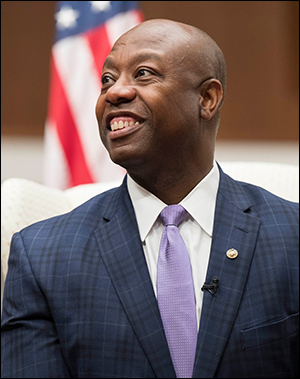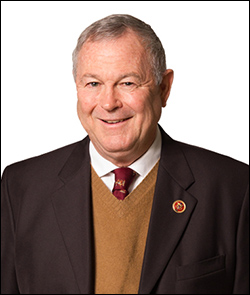By Jim Ellis — Friday, April 14, 2023
President
Sen. Tim Scott: Exploratory Committee Formed — South Carolina Sen. Tim Scott (R) announced the formation of a presidential exploratory committee, which is likely his first official step toward becoming a national candidate. It’s hard to see a Republican nomination victory path for the senator, however. South Carolina is obviously the heart of his support base, but with the state’s former governor, Nikki Haley, already in the race, even that is diminished.Should Sen. Scott advance into official candidacy, it is likely that former President Donald Trump will be the chief beneficiary. The more crowded the candidate field, the more favorable to Trump.
Senate
Wisconsin: Sen. Tammy Baldwin to Seek Third Term — As expected, Badger State Sen. Tammy Baldwin (D) announced this week that she will seek a third term next year. Baldwin was first elected to the Senate in 2012 but has been in elected public office consecutively since 1985. Prior to winning her current position, Baldwin served in the US House, the Wisconsin state assembly, the Dane County Board of Supervisors, and the Madison Common Council.
No Republican has formally come forward, but several individuals are considering the race. Unless the congressional map is redrawn, it is doubtful any member of the US House delegation will run. Former Lt. Gov. Rebecca Kleefisch is a potential candidate as is businessman Scott Mayer. While Sen. Baldwin will be favored for re-election, the 2024 Senate race could well become highly competitive.
House
AZ-6: Re-Match Brewing — We are seeing several re-matches take place in 2024 US House races, and one in Arizona became official yesterday. Last November, Republican Juan Ciscomani (R-Tucson) defeated then-state Sen. Kirsten Engel (D) by a 50.7 – 49.2 percent count, a margin of 5,232 votes. Now, Engel returns for a second chance.
Arizona’s 6th District sits in the southeast corner of the state and contains approximately half of the city of Tucson. The FiveThirtyEight data organization rates it as R+7, but Dave’s Redistricting App sees a closer 50.9R – 47.1D partisan lean. Count on another close finish in this desert congressional district.
CA-47: Ex-Rep. Harley Rouda Forced Out — Former Rep. Harley Rouda (D), who held the former 48th Congressional District for one term, had announced a comeback attempt for next year’s political contest in new District 47. Unfortunately, Rouda was involved in a falling accident in which he sustained head injuries. On the advice of his physicians, Rouda says that he will now not pursue his 2024 candidacy and instead concentrate on returning to full health status.
This development means we will now almost assuredly see an open-seat contest between state Sen. David Min (D-Irvine) and 2022 congressional nominee and ex-state Assemblyman Scott Baugh (R). In the previous election, Baugh lost to incumbent Rep. Katie Porter (D-Irvine) by a 51.7 – 48.3 percent split. Rep. Porter is leaving the House to run for the US Senate.
NY-19: Another Re-Match Brewing — Continuing with re-matches, attorney Josh Riley (D), who lost 49.9 – 48.4 percent to now-freshman Rep. Marc Molinaro (R-Red Hook), announced that he, too, will return for another campaign in 2024.
The Upstate 19th District, anchored in Ulster and Dutchess Counties, is rated as R+1 from the FiveThirtyEight data organization, while Dave’s Redistricting App sees the partisan lean as a much different 52.0D – 44.6R. Democrats are already committed to targeting the Hudson Valley seats, so expect this race to transform into a national congressional campaign.






